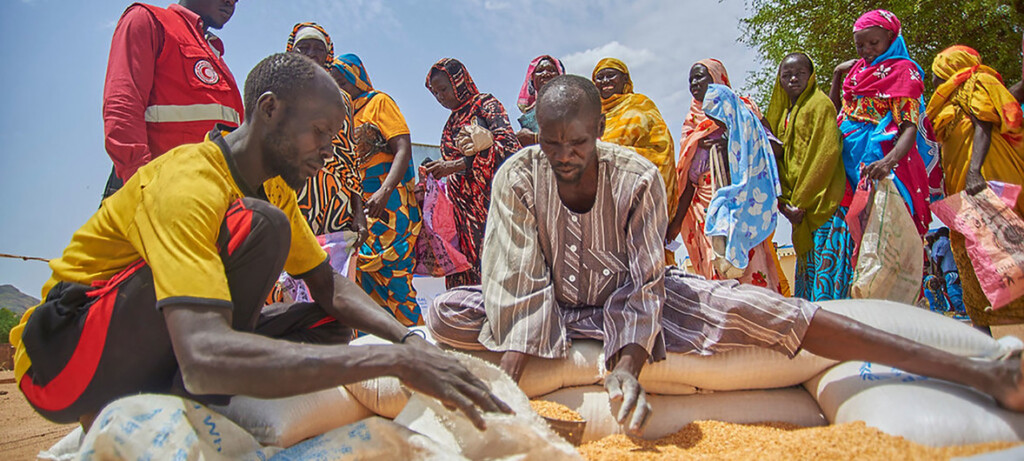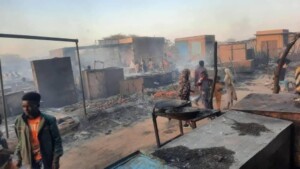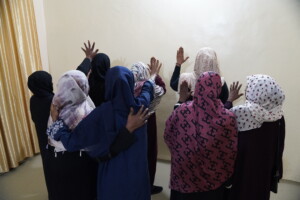WFP: Sudan hunger levels ‘highest ever recorded’

WFP food distribution to displaced people in Kadugli, South Kordofan (File photo: OCHA/Sari Omer)
Sudan faces a humanitarian ‘catastrophe’ amidst the ongoing war, with increasingly alarming hunger levels that have doubled in the span of a year, the UN World Food Programme (WFP) said today. The UN Food and Agriculture Organisation (FAO) yesterday reported that at least 37 per cent of the population is grappling with severe levels of food insecurity.
In a news release yesterday, WFP warned that “nearly 18 million people across Sudan are facing acute hunger (IPC3+) – more than double the number at the same time a year ago”.
The statement continues: “This figure is also higher than the initial projection of 15 million made in the previous assessment in August, demonstrating just how rapidly the food security situation is worsening”, citing a report by the Integrated Food Security Phase Classification (IPC).
Although Sudan’s harvest season, spanning October to February, is typically a period where food availability is at its peak, the country now witnesses “the highest levels of hunger ever recorded”.
If no urgent intervention takes place by May, in time for Sudan’s lean season, “conflict hotspots could see the emergence of catastrophic hunger, also known as Phase 5 on the Integrated Food Security Phase Classification (IPC),” WFP predicted.
The UN Food and Agriculture Organisation (FAO) yesterday also warned about an escalating hunger crisis, in particular in the most affected regions: Darfur, Kordofan, and Khartoum. Approximately 37 per cent of the population is grappling with severe levels of food insecurity.
FAO representative in Sudan, Hongjie Yang, emphasised FAO’s “unwavering commitment to support Sudanese rural communities”, adding that more than $75 million are urgently needed to make it possible. “These funds are crucial to address escalating needs, enhance local food production, and improve its accessibility across the country.”
‘Catastrophic’
Adam Rujal, spokesperson for the General Coordination of Darfur Displaced and Refugees, highlighted the severe threat of famine looming over hundreds of thousands of displaced people in camps across the region. “The suspension of many World Food Programme (WFP) services in the region for eight months due to the ongoing war has left these populations even more vulnerable.”
Describing the conditions in the camps as ‘catastrophic’, Rujal noted to Radio Dabanga that the halt in food rations and the inability of the displaced to seek employment for income results from the heightened security risks outside the camps. “Urgent intervention by organisations is crucial to address this dire situation effectively.”
Sofie Karlsson, head of OCHA Communications and Analysis, told Radio Dabanga on Monday that while WPF, FAO, and UNICEF, together with humanitarian partners, are providing food assistance, treatment of malnourished people, and seeds for farmers, “this is not enough”.
Last week, sheikh and social activist Younis Matar warned of an “imminent famine” in Darfur and accused the warring parties of fighting for “seats of power at a time when people are starving to death”.
Dire conditions
Kadugli, the capital of South Kordofan, is grappling with catastrophic humanitarian conditions. A resident told Radio Dabanga that South Kordofan now is witnessing a severe shortage of sorghum, the region’s strategic crop and primary food source for much of its population.
“Many families struggle to afford two meals a day”, she pointed out, blaming a substantial increase in prices for essential goods coming from South Sudan.
Radio Dabanga reported in September that merchants at the markets of South Kordofan resorted to barter trade and dealing with South Sudanese currency because of the persisting liquidity crisis in the state.
In the North Kordofan capital El Obeid, people complain of an unprecedented rise in fuel prices. A cart owner in the city told Radio Dabanga that the price of a gallon of petrol rose to SDG 20,000.
Listeners in Atbara, River Nile state, reported it is impossible for pupils to return to school, considering multiple challenges, including that many schools in the area are sheltering thousands of displaced, mostly stemming from Khartoum. Souad Ahmed, a researcher and activist, told Radio Dabanga about the harsh living conditions of the displaced, “many of whom suffer from chronic diseases such as kidney failure and cancer and are in dire need of healthcare”.











 and then
and then